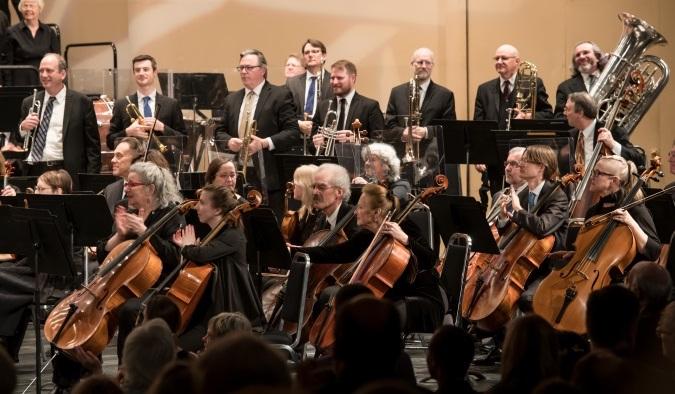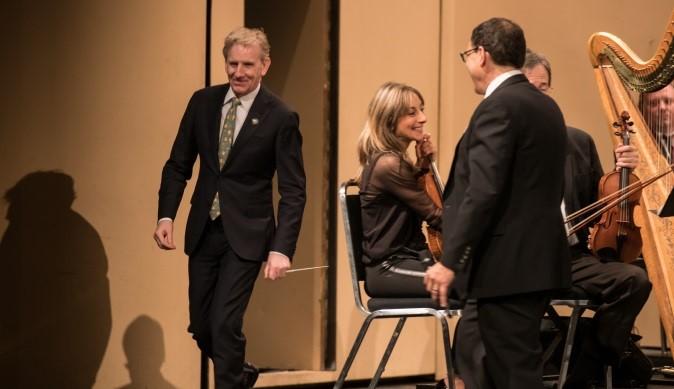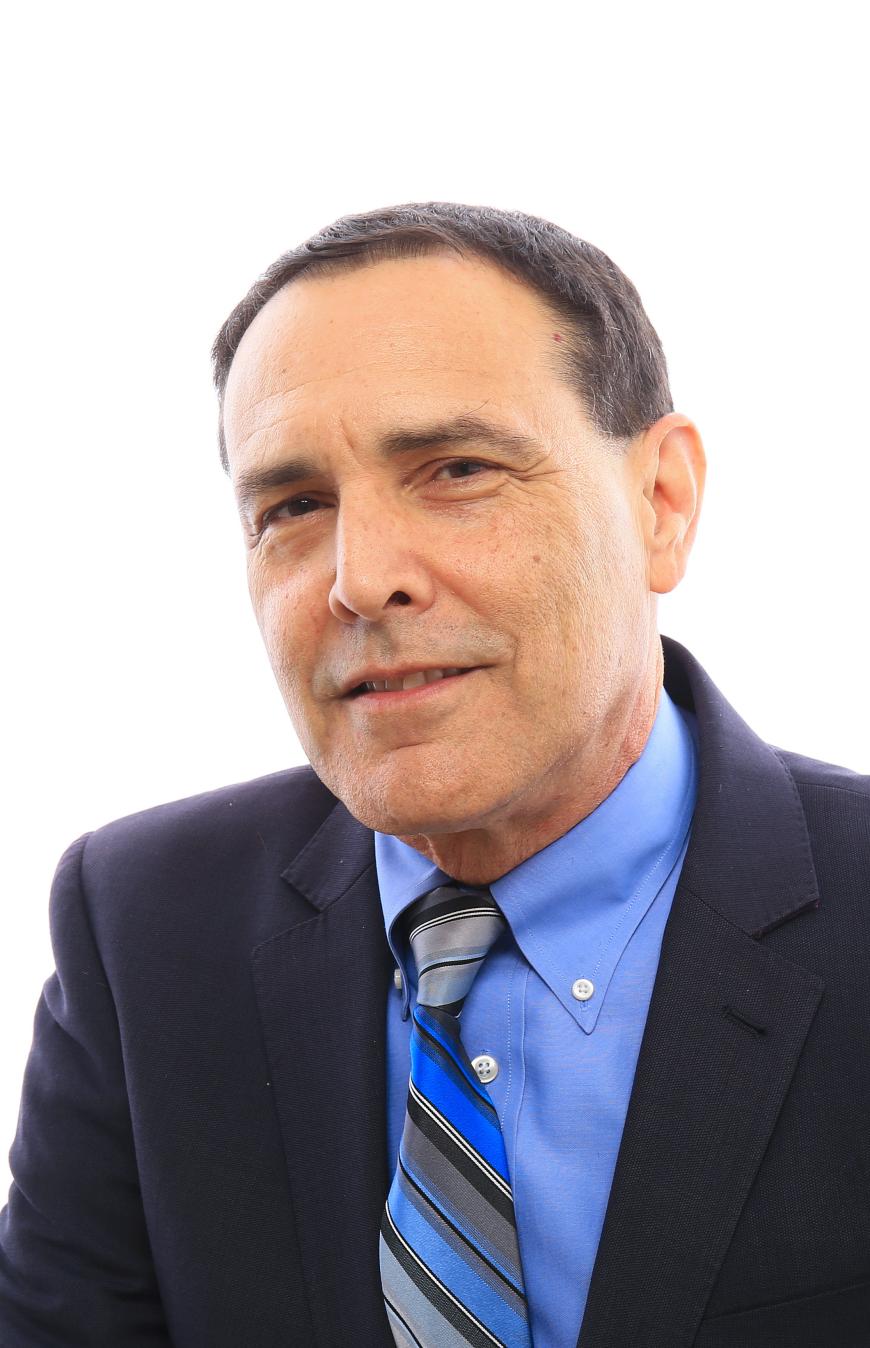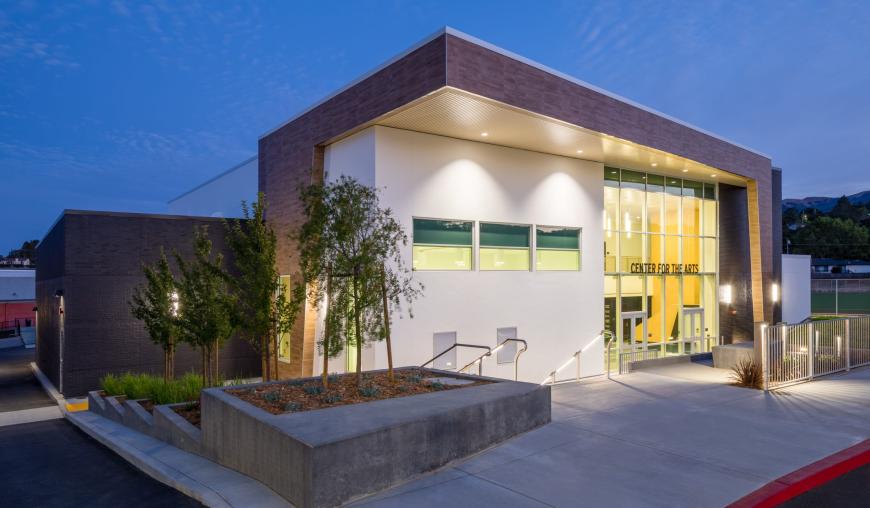
Since 1971, the Veterans’ Memorial Auditorium (VMA) at the Marin County Civic Center has been the home of the Marin Symphony. Three years ago, however, the 85-musician orchestra, founded in 1952, was hit with the unexpected news that the VMA would be closed for seismic retrofitting during the 2022–2023 season and that the orchestra would have to find an alternative venue.
On top of that, the Symphony was embarking on a difficult search to replace its illustrious music director, Alasdair Neale, who was departing at the end of that season after 22 years at the helm. A committee of 12 members, including musicians, board members, and staff, meticulously reviewed 125 applicants for the position, narrowing them down to four finalists.
For Neale’s final season, the orchestra’s administration first planned to hold concerts in the much smaller Exhibit Hall, also at the Marin Civic Center. The Symphony initiated its season-subscription campaign based on that assumption. But as construction delays at the VMA piled up one by one, the Symphony was able to rebook each concert back at its home venue, which took many hours of staff time.

“It was great that we could do it,” said Executive Director Tod Brody. “It made for better concerts and a much more fitting close to Alasdair’s brilliant tenure here. But at the same time, it created tremendous upheaval.”
“We were extremely lucky to have Alasdair as our maestro for so many years,” said Steve Machtinger, president of the board of directors and a violist with the Symphony since 1982. “The Marin Symphony was at its peak during his final concert, which concluded with a tremendous performance of [Gustav] Mahler’s First Symphony. It was one of the greatest moments in the long history of our orchestra, and it was also our last concert before the hall was closed for renovations.”
As the retrofitting was completed, however, additional structural issues due to water damage surfaced, further complicating the construction timeline, which now extended into the 2023–2024 season and possibly beyond.
“We found out fairly late in the game that the VMA would be closed for that season, and we made the decision [that] we didn’t want to present the music-director candidates conducting a smaller orchestra in a small venue,” explained Brody. “We wanted to see what they could do in the big hall with the big orchestra, so we pushed that out a year, and then we planned a season that was different than anything we had ever done, which was a series of chamber orchestra and chamber music concerts, mostly at College of Marin.” The college was the orchestra’s home base from 1964 to 1970.

The overhaul of the 2023–2024 season, of course, involved more hours of staff time, including researching, setting up, and managing a new online ticketing platform. But the staff and board, many of whom are also musicians (including Brody, who has an extensive career as a principal flutist with major orchestras and smaller ensembles), have remained strong and positive.
“I really view the Marin Symphony as a cultural jewel of the county,” said Margot Golding, who joined the orchestra in 1998 as principal oboe. She is also on the board, as well as the committee that vetted the music-director candidates. “By using the smaller venues to do chamber music concerts, we found that there is a subset of the audience [that loves] chamber music and others who didn’t know they loved chamber music but decided they did when they came to our concerts.”
Although Golding was happy about the response to the chamber concerts, the flip side was that the organization had no venue to do its larger symphonic repertoire. There were other issues as well.
“Due to the constraints imposed by the smaller venues, we were unable to assemble the entire orchestra onstage during this past season,” said Machtinger. “As a member of the viola section, I was able to play only two of our four [chamber] orchestra concerts, and I missed the opportunity to make more music with my colleagues.” That lack of playing time together can affect an orchestra’s performance.
Despite all of these setbacks, Brody said that the recently completed season was far more successful than he had imagined and that some of the smaller chamber concerts had even sold out. And even though attendance was down from previous seasons, so were expenses.
Fortunately, the Symphony is a tight-knit organization with committed longtime employees who are working together to overcome the adverse circumstances.
“The staff has been remarkably consistent and for good reason — because we work well together,” said Brody. “One of my goals as a manager is to try to create a place where people want to come to work. It’s a musician-run organization, which is not typical, and I think that affects a lot of things.”

Normally the orchestra would have announced its 2024–2025 in late February or mid-March of this year, but because most of its concerts were being presented in venues attached to educational institutions, like College of Marin and Marin School of the Arts, the group had to wait to find out which dates were free. (School ensembles and presenters have first dibs on the facilities.)
With most of the logistics straightened out, the Symphony is planning to announce its coming season soon. It will include four separate concerts, each featuring one of the four music-director candidates — Robert Kahn, Fawzi Haimor, Alexandra Arrieche, and Brad Hogarth. Each conductor will be performing with as large a portion of the orchestra as possible.
“This decision aims to provide a comprehensive assessment of the candidates’ capabilities with major repertoire, ensuring the best fit for the Symphony’s future,” said Brody.
In addition, the season will include two chamber concerts, the annual “Holiday Choral by Candlelight” concerts with the Marin Symphony Chamber Chorus, a concert featuring the larger Marin Symphony Chorus, the return of pops concerts with conductor Stuart Chafetz, and Symphony Day, part of the orchestra’s educational outreach. It is hoped that using as large an orchestra as possible will reestablish the capabilities of the Symphony.
“We decided at a recent board meeting that we should stop calling it a chamber orchestra,” said Golding. “And we had to figure out a way that we could go back to [saying], ‘This is the Marin Symphony.’ And that’s when we collectively said we should add more players. So now we can do a Brahms symphony or an [Antonín] Dvořák symphony, and we feel we can once again bill ourselves as the Marin Symphony.”

Although working in smaller venues has been challenging, everyone agrees that the experience of the last year has created some unexpected opportunities.
“The enthusiastic response to our series of chamber concerts … was one very positive surprise,” said Machtinger. “We will integrate this feature into our future programming even after we have returned to the hall. And as a result of the innovative programming produced by Tod Brody, our audience has been able to get to know the musicians of the Marin Symphony in a more personal way than ever before.”
Brody disclosed that when he last heard from the county, he was informed that the VMA repairs would be completed by December 2025. But he noted that the inspectors and contractors still hadn’t completed their assessment of the damages, so being able to hold the orchestra’s 2025–2026 season in the venue is still not assured.
“Even if they come along and say, ‘OK, this is what we are going to do, and we should be done by December 2025,’ we would have to be extremely confident that they were going to meet that goal before we could plan a season in the VMA,” said Brody. “Because we plan a year and more ahead, we can’t just hope they’ll be done by then.”
Brody, however, is optimistic that many of the Symphony’s longtime patrons will return in the 2024–2025 season.
“We are looking forward to a brilliant season and to getting to know the new music-director candidates,” said Brody. “Doing a season like the one we just did and the one we have planned for next year necessitates a lot of communication with people, and that’s the life blood of an organization like ours — relationships with our attendees and our patrons.”
Ultimately, Brody believes that the hardworking staff will be able to weather any problems that emerge.
“I think organizationally we are in a good place, even though we are short a music director and a concert hall and we have a future that’s full of fog,” said Brody. “But whenever we’ve had adversity, we have all been able to work together on it, and that’s been golden.”




